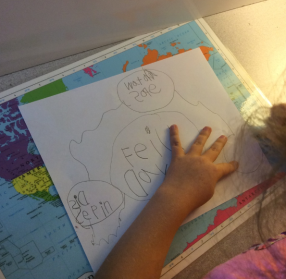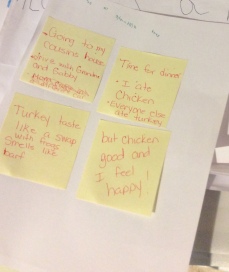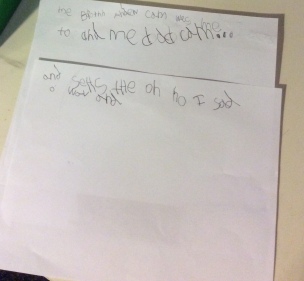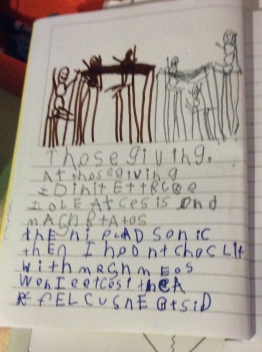In a previous post, I shared writing gems that caught my attention. But, these gems were only some of the treasures I found. Hiding in the piles of writing were quiet writers, writers whose empty folders cried out for help. These writers became my focus for the next two weeks, and this post. Quiet writers cry out for help in all our classrooms.
Meeting Writers Where They Are
I looked at the sparse folders; stories with loosely connected events, stories started and finished on 1 page, and I started planning. I planned minilessons on story planning, guided writing groups on generating ideas and developing a story with a beginning, middle and end going across pages, and conferences where writers could talk about their writing. Each level targeted for particular students.
The Minilesson
I demonstrated how writers might plan with a story map. The students were eager to participate; determining the topic and the many the events to tell the story. A few writers created a web, but in the days following, the excitement waned, and story webs disappeared. Webs were not the preferred tool for this group.

Guided Writing
I gathered five writers whose folders held empty pages. I showed the writers how to write using a story web to collect and connect ideas, just as we had done as a class. I began the lesson by explaining how we were going to work together to create a story using the web we made in the minilesson. The writers were excited and eager to work with me. We started our writing, me with the pen and the students organizing the ideas from the class created web. We worked until the story was composed. I handed each student a page to illustrate and with this the lesson ended.
The next day I called the group together again to help the writers transfer their new learning to independent writing. As we started, I watched the writers struggled to find the pages of our story. I realized the writing we had done wasn’t important to them; they lacked ownership. Had I missed the mark in my analysis of the lack of work from these writers? What was it they needed from me? How could I best teach these writers?
Readjusting
I had to think quickly. The goal of MY lesson was to support writers in creating a story they wanted to tell, a story that mattered to them. So at this point I did what I am afraid I sometimes forget to do. I asked the writers to tell me what they needed?
“I can’t remember my story when I go home and then try to write it again tomorrow.”

What this writer needed wasn’t instruction in how to generate a topic or supporting ideas. He had all of these things. What he needed was a way to hold onto his thinking. So together we talked about his story, we wrote his ideas on post-it notes. As we talked, his excitement grew. Soon he was writing small, or talking small.
“Turkey tastes like a swamp with frogs and smells like barf!” He made sure we got this idea jotted down, “That’s funny, I should write that.”
As I left, I heard him tell his neighbor, “I got all my pages ready” as he began to write.
“I want to write about butterflies because I know a lot about them, but I have to think a lot and that takes me a long time”

This writer simply needed permission to take a break from her story. At the end of the next workshop, I found this in her folder. A personal narrative, craft, and onomatopoeias were hiding behind her fear of abandoning a story! I am pleased to see this writer writing freely!
“I want to tell you about my weekend, but I have to write in my folder.”

Each Monday students begin the day writing in their “Weekend News” journals. This writer didn’t know it was okay to carry this writing into the workshop and often abandoned stories. I assumed all the writers in our room knew they could bring weekend journal writing in the workshop.
I noticed this writer is learning to write small. An important step for a writer and to think I almost missed these new brave steps in writing.
Reading the work of the writers is just the start, teaching the writer, requires conversations and listening.


I love reading your posts, Deb, and how you invite us into your classroom, your questions, and your process. It is such a relief to read about how other teachers problem solve! This was brilliant. I love all the steps you took to help the writers and how, in the end, they knew what they needed! What a great reminder to actually ask the kids how we can help them. Thank you!
LikeLike
I love your point, Deb. It truly is about a writer’s owning their topic. Many times our writers need to be released from a piece that they have started working on that is NOT working for them. They must be allowed to begin a new piece for them to progress.
I had a similar situation with a writer working on a persuasive essay. She started to write a piece about her family, but recently, her family has gone through some tough changes. And because of this, she couldn’t continue her original piece.
She asked me if she could write a piece to persuade her mom to get her a German Shepherd. Once I said, ‘YES” ,she began to research and draft her new piece.
We must always be open and supportive to our writer’s ideas, otherwise, it doesn’t work! Thank you for your transparency in this blog.
LikeLike
Terrie,
Thank you for taking the time to share your thoughts! You are an A Number 1 commenter! It makes me so happy to hear your student was able to write about something that made her happy. Especially when her world was caving in around her.
Isn’t it amazing how much we learn about our students through writing?
Thanks!
Deb
LikeLiked by 1 person
Deb, I have a handful of “quiet writers” as well. You have inspired me to do a small group guided lesson with them. I do see that one of the challenges they share is that they can’t read their writing when they go back to work on it again. We are in first grade and my writers are at different places with developing their handwriting and spacing. I have given stickers to one student for help with spacing. He puts a sticker between his words. Do you have experience with helping kiddos read their own writing the next day when they want to continue their work?
LikeLike
Rereading writing or even remembering writing can be a challenge for our younger writers. A few tips I have tried: asking the writer to read and talk about the story with a friend at the end of the workshop then talking with them the next day to freshen the memory, reading to me (and I jot down key points on a post-it note and place it on his piece), read his story, or tell his story into a digital recording tool (Pixie, EduCreations, VoiceThread and the list is endless). Of course, these are all band-aids to the larger problem of why they can’t read their writing. Whether it’s poor organization, lack of word knowledge, or just not remembering the story all of these can be instructed during interactive writing or in minilessons.
LikeLiked by 1 person